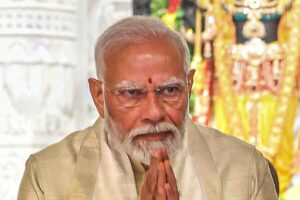News Desk, Kolkata : Indian Prime Minister Narendra Modi inaugurated the Ram Temple in Ayodhya on Monday, triggering a swift response from Pakistan. According to the Pakistani Foreign Minister, this move by Modi is seen as a step towards establishing the dominance of the majority community, reinforcing the alleged Hindu-centric agenda of the Indian government.
The roots of this contentious issue date back to December 6, 1992, when a group of kar sevaks (religious volunteers) demolished the Babri Masjid in Ayodhya, claiming it was built on the birthplace of Lord Ram. This incident led to communal tensions and legal battles, with the Supreme Court later giving its verdict in favor of constructing the Ram Temple on the disputed site.

Pakistan’s response to Modi’s inauguration of the Ram Temple reflects its concerns about the alleged marginalization of religious minorities in India. The Foreign Minister’s statement suggests that the Indian government not only failed to bring the perpetrators of the Babri Masjid demolition to justice but also actively supported the construction of the Ram Temple on the disputed land.
While the official Pakistani stance emphasizes the negative impact on Indian secularism, recent reports indicate that the focus on religious sites is not limited to Ayodhya. There are concerns about potential developments in Varanasi’s Kashi Vishwanath Temple and Mathura’s Shahi Idgah Mosque, raising fears of a trend targeting historical Muslim places of worship.
Contrary to the Pakistani claims, it’s crucial to note that the Supreme Court’s decision in the Ayodhya case was centered on resolving a specific legal dispute rather than endorsing any particular religious agenda. Additionally, individuals involved in the Babri Masjid demolition faced legal consequences, with the special CBI court in Lucknow acquitting Lal Krishna Advani, Murli Manohar Joshi, and others, emphasizing the lack of evidence against them.
However, the geopolitical implications of Modi’s actions go beyond domestic legal nuances. The Pakistani government’s response indicates a heightened sensitivity to religious dynamics in the region and an interpretation of India’s moves as part of a broader pattern affecting the status and rights of Muslims.
As the narrative unfolds, it becomes apparent that the concerns raised by Pakistan echo a broader sentiment within the Muslim community in India. There is a growing unease among Indian Muslims, not just about the Ayodhya issue but also regarding the potential impact on their economic, social, and political standing in the country.
The developments in Ayodhya serve as a backdrop to a larger narrative of identity politics in India. The construction of the Ram Temple is seen by some as a symbol of Hindu pride, while others perceive it as a threat to the secular fabric of the nation. This polarization is not new, but the recent events have reignited debates around the delicate balance between religious freedom and secular governance in India.
The global community is closely watching these developments, considering the strategic importance of the Indian subcontinent. The diplomatic implications of religious tensions between India and Pakistan are significant, affecting regional stability and cooperation.
In conclusion, the inauguration of the Ram Temple in Ayodhya has sparked not only religious fervor but also geopolitical concerns. While Pakistan expresses apprehensions about the Indian government’s alleged religious bias, it is essential to navigate through the complexities of legal decisions, societal perceptions, and geopolitical considerations. As India grapples with the aftermath of the Ayodhya events, the challenge lies in fostering inclusivity and addressing the concerns of all communities to maintain a harmonious and diverse society.
DISCLAIMER
Our news media denounces any form of bias and disapproves of sensationalism. The disseminated news is entirely educational and aimed at social awareness. Our media maintains absolute impartiality, adhering solely to the purpose of education and social consciousness.


